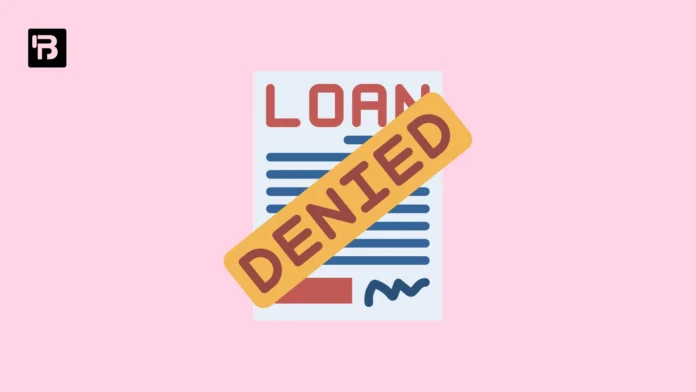Banks and other financial institutions provide excess of different lending programs. Technological progress has enabled a more efficient and contemporary approach to the loan application process. Lending standards may have been relaxed recently. One of the most popular types of loans in India is the personal loan.
More than 78% of credit applications in India are in this subset. The lack of collateral makes these loans attractive to many consumers.
Some people, however, have their loan applications declined. A request for a Personal Loan might be declined without proper research.
The next time you apply for a loan, you’ll be more prepared if you know the reasons why you were denied. If you were turned down for a loan or application and want to know why, keep reading!
Why You Probably Won’t Get Approved for a Personal Loan?
Let’s take a close look at the most typical causes of rejection for unsecured loans.
1. Having a Poor or No Credit Score
A credit score, which can vary from 300 to 900, is one factor that lenders use to determine whether or not to extend credit to you. Before granting a Personal Loan, many lenders have their potential borrowers fulfil a minimum credit score criteria.
This is perhaps one of the most common grounds for loan denial. If your credit score is lower than this, then you will not be able to get this loan. Candidates without a credit score may also be rejected since the lender will have no way to assess the applicant’s financial responsibility.
2. Several Loan Inquiries and Applications
Applying for Personal Loans from multiple banks might result in multiple application submissions. Always remember that the bank will check your credit history and score whenever you apply for a personal loan.
This might cause lending organizations to lose faith in you as a responsible borrower and give you a negative impression of your financial stability.
3. Numerous Pending Loans
This is a big reason why so many people cannot get a personal loan. Your application for a Personal Loan may be denied if you already have several debts and other obligations that consume the majority of your income.
Banks may access your financial profile and credit position even if you have taken out loans from third-party banks, therefore it is important to only take out loans when necessary and make sure you pay your instalments on time. If you have multiple outstanding debts with banks and NBFCs, your chances of being approved for a Personal Loan will diminish.
Maintain low levels of debt and save at least half of your paycheck each month to lessen the likelihood of your application being rejected.
4. Income Requirements Not Met
Before approving a Personal Loan, financial institutions require assurances that they will get their money back on time. To ensure that they will be repaid in time, lenders check applicants’ income.
Your capacity to make timely EMI payments is contingent on your income being sufficient and stable. Salary employees have more stability in their income and can thus more easily qualify for a Personal Loan than those who are self-employed.
Most lenders have set minimum income criteria for both salaried and self-employed customers. Your application for a Personal Loan will likely be declined if the amount you requested is greater than what you can borrow.
5. Not All Requirements for Eligibility Have Been Satisfied
Your application for a Personal Loan will be granted only once we have verified your supporting documentation. If any of the paperwork that the lender needs is missing or has discrepancies, they will reject your loan application.
Your Personal Loan application is only as strong as the supporting documentation you provide with it. Name, age, income, and residence are just some of the pieces of information that will help the lender decide on your Loan application.
If any of these or any other parts of your Loan application are found to be incorrect, your loan request will be refused.
6. History of Unstable Employment
The approval of your Loan may also depend on your job history. This is perhaps the most common cause of loan denial. Inconsistent employment over a certain length of time or frequent job changes will result in a denial of your request for a Personal Loan.
Applicants who work for unrecognized enterprises or who are paid in cash are often rejected by financial institutions. To mitigate the risk of loan default, lenders carefully examine borrowers’ work histories.
Therefore, loan applications from people with less than a year of work experience, or who have been with their present job for less than six months, may be turned down.
How to Increase Your Chances of Getting a Personal Loan
- Proving other income sources, such as variable compensation, quarterly incentives, and money from other sources might help you overcome low income and increase your eligibility.
- Pay off all of your existing obligations and credit card payments promptly before applying for a Personal Loan. Your credit rating will improve if you do this.
- Apply for the loan alongside a family member who has better credit and a bigger salary.
- Don’t apply for many loans at once, as doing so increases the likelihood that your applications will be denied.
- Find a lender that can accommodate your situation and wants.
Conclusion
It’s simple to obtain a personal loan. You simply need to fill out one simple online form with all of your pertinent information once to obtain immediate or the following business day approval. Even though the application process is brief, acceptance is not guaranteed. It is vital to offer accurate information on the application since lenders often verify it before approving the loan.
If you’re looking for a Personal Loan, we hope the information on this page will help you avoid making the same mistakes that have led to rejection for so many others.


